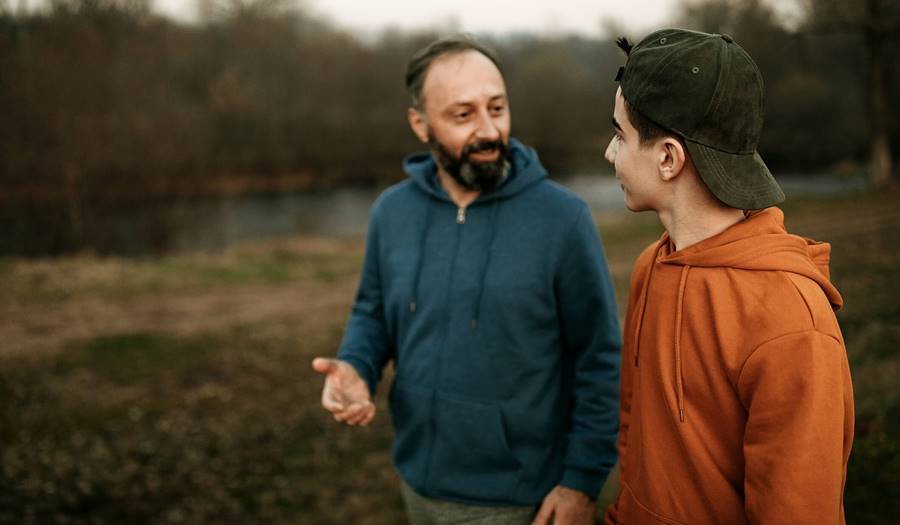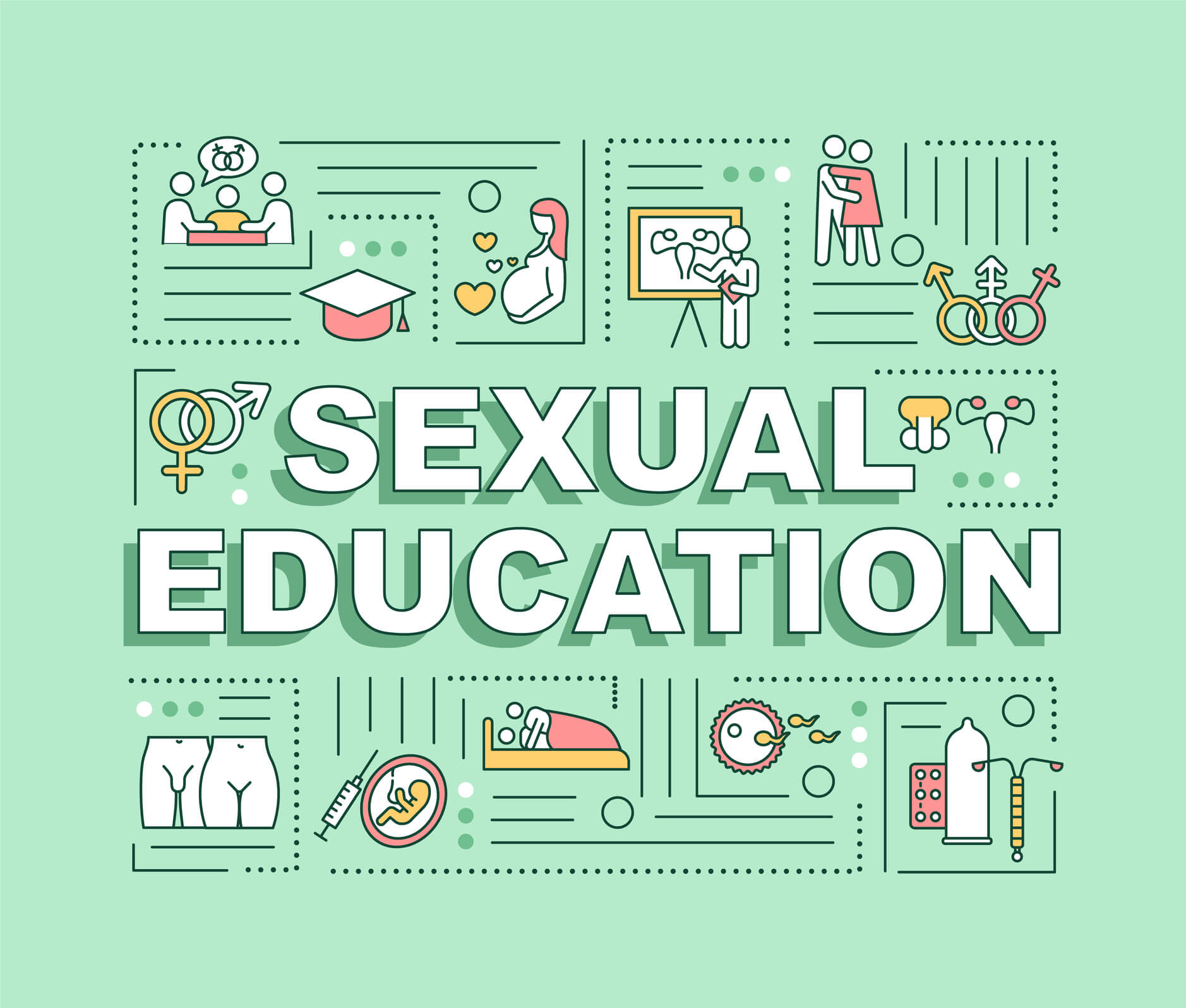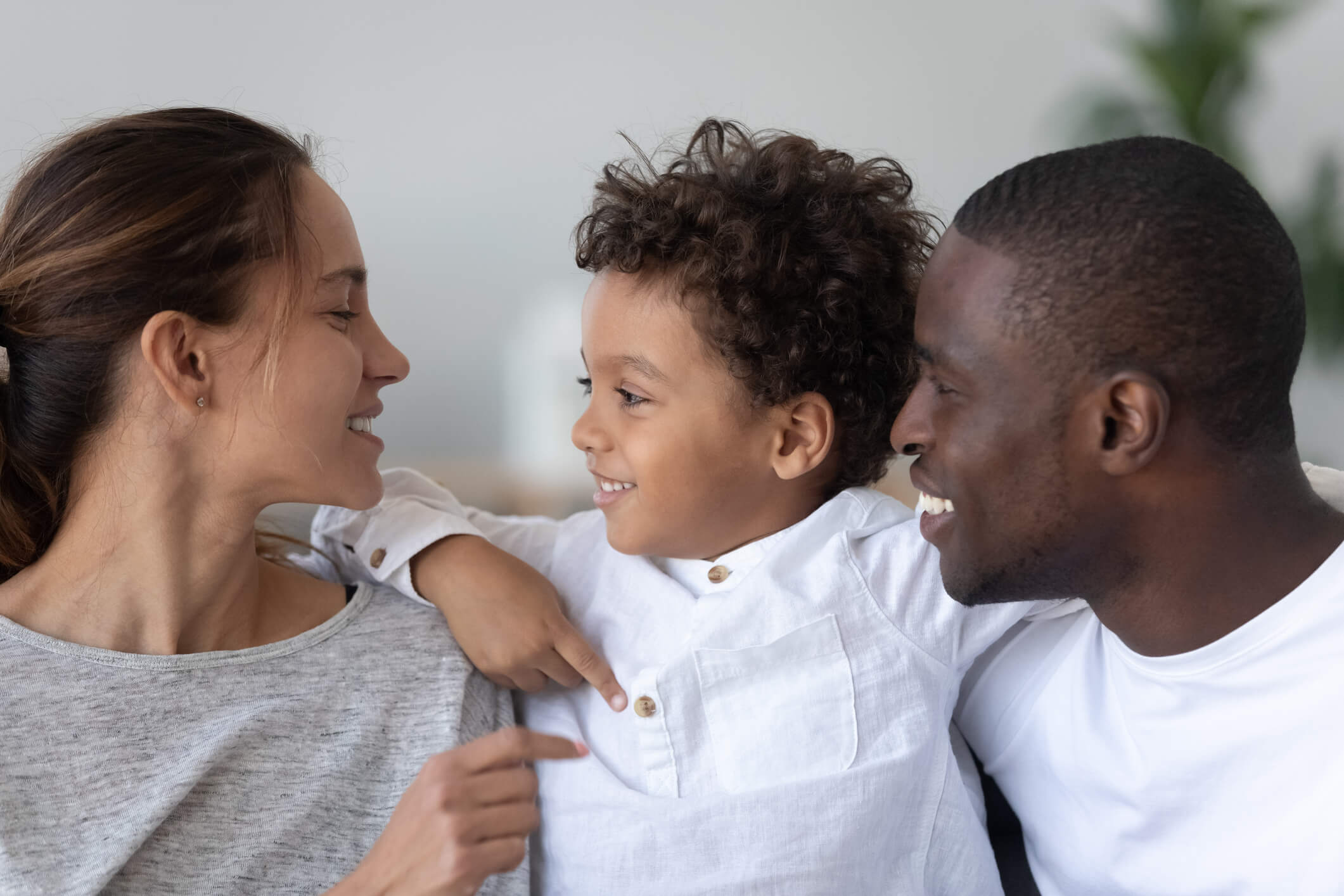
Sex Education
11/22/2021
Updating "The Talk" to Keep Our Kids Safe and Healthy

The past two weeks we have learned about puberty. Puberty can be an uncomfortable conversation to have with our kids. Everyone goes through it but that doesn’t make it easier. Our next topic is similar but even more uncomfortable! It’s sex education!
Providing sex education to our children is a challenging topic to tackle. It can be awkward and scary. Ignoring it doesn’t help the matter and avoiding the topic can hurt our children. Children are curious and will seek out this information. Your child is exposed to information via society, movies, tv, images, online, and via friends. These should NOT be their primary source of information. You need to be involved with their education. You want your child to have the correct information that will help them lead a healthy and safe life.
And the sex talk is no longer just “the birds and the bees”. To provide the necessary information for your child to have healthy relationships and safe sex we need to also include information about consent, contraception, sexually transmitted infection, and pleasure. This week we will talk about when, how, and what you should be discussing with your child.
The Birds and the Bees
When and how should children learn about sex? At home, at school? First let’s learn about the when, how, and whys. Then we will explore the information that should be included in the talk!
Sex Education at Home
Talking about sex shouldn’t be a one-time conversation but a series of conversations over time. These conversations need to be open and honest. Many of us were raised the bare bones sex education. You may not know all the right answers. Try to provide the correct information and seek out information you are uncertain about.
When
Time and place are important factors for conversations. The first opportunity is often with young children, as early as age 3! Most children surprise their parent with “Where do babies come from?” at some point! Feel free to excuse yourself for a moment to gain your composure before you answer!
Often for older children, we are bringing up the subject to them. Pick a time where you can have privacy and it is lower pressure (such as driving in the car—no eye-contact necessary!) or when an opportunity is presented by a movie, tv show, or life event.
How
The conversations need to be age appropriate. This means the younger your child is the simpler the explanation can be. Often, we over-explain things to younger children who aren’t ready or don’t want all the information we try to supply. It can be helpful to ask them questions about their question, before answering. This can help you identify the information they want and help provide just that information. It is important to use correct terms for body parts and reproduction no matter their age.
As your child gets older, the explanations can become more in depth and detailed. You will also have other topics to discuss such as relationships, safety, and consent These topics can easily be worked into conversation when watching movies or tv as they are often ignored!
Tone
Sex education should be a positive experience for you and your child. It should not be a time to infer negativity. It should include more about what TO do and less “don’t” do.
It is a time to provide information but also to empower your child to know they deserve good and healthy relationships. You want to empower your children to ask questions and for them to know you will answer their questions to the best of your ability or help them find the answers. Open and positive communication will build trust between you and your child. This is important as they grow older and may run into relationship problems and they need a trusted adult to help them through.

Benefits of Providing Information
Providing information does NOT increase sexual activity. Children are curious and will seek out this information whether you provide it or not. If a child does not receive education, they will seek it out. They will find information online, through pornography, through friends, through risky experimentation, or through unsafe experiences.
Education is necessary for the health and safety of your child. Providing sex education at home that includes correct words for body parts and reproduction, as well as discussing consent, makes your child safer. Children who receive this type of sex education are less likely to be targeted by predators. They are also more likely to speak up during or after abuse.
Discussing sex, including the positive parts of sex, can seem weird (and uncomfortable) but it helps prepare our kids to have safer and more meaningful sex. It can help them learn to reject harmful narratives or myths about sex (for example that boys want sex and girls should not, or that disabled people are not sexually active, or hypersexualizing certain populations). It helps identify what sex should look like, who should be having it, and how a person should decide to become sexually active.
Adolescence is a time for practicing relationships and learning. We want to make sure they have learned all the information needed to make healthy choices in these relationships. We want them to know they can come to you with any issues, and you will NOT stop loving them but provide them with help and support. Open and honest talks and informative sex education is the key to this type of relationship.
Faith and Culture
Teaching the correct information doesn’t mean you do not or cannot include your family, cultural or religious values, it is just giving information. Your culture and faith may guide when sex should occur as well as offer guidance on pregnancy, contraception, gender, and gender roles. Even within the same culture or faith people can have different thoughts on these subjects. Different beliefs are okay and should be explored and discussed. Even though faith and culture may recommend or require abstinence or have other rules to follow regarding contraception, gender roles, and pregnancy, these need to be included in your child’s sex education.
Sex Education in School
Only 24 states and Washington, D.C. mandate sex education in schools! And 9 states have no mandate including Massachusetts! Even if sex education is required, the quality varies. It may include information about puberty, reproduction, contraception, and consent or it may be limited to just abstinence-based education. It may purposefully leave out information about intercourse, sex outside of marriage, non-heterosexual relationships, any contraception besides abstinence.
States in which abstinence only education is provided have lower rates of contraceptive use, higher rates of teen pregnancy, and higher rates of sexually transmitted diseases. This type of education is ineffective and harmful. Leaving out information or refusing to provide complete and accurate sex education DOES NOT stop sexual activity, pregnancy, or the spread of disease. What it does instead, is it sends children into experiences without the information they need to protect their body.
Because you cannot rely on school to provide all the information, you must supplement this education at home.
The Talks
Puberty and new romantic and sexual feelings mean it’s time to start more detailed sex education. Great sex education includes information on puberty, reproduction, sexuality, contraceptive information, HIV/AIDs, and sexually transmitted infection education as well as information about healthy relationships and consent. And sex education should include information for LGBQTIA+ and disabled children even if your children do not fall into these groups.
We will go over this information as many of us either had no sex education or the limited sex education presented in middle and high school!
What is Sex
Sexuality
Sexuality is the combination of sexual orientation and sexual behaviors. These are affected by your body, culture, relationships, personal history, and self-expression. Knowing that sexuality is affected by all these is important for sex education and understanding why and how we have sex as well as understanding pleasure.
Reproduction
Every species reproduces. Sex Is how humans reproduce. Puberty is the process that makes our bodies ready to reproduce and creates the possibility of pregnancy.
Reproduction occurs when sperm from a male combine with an egg from a female. A female ovulates an egg monthly. During ovulation the egg is released from the ovary into the fallopian tube. During the journey from the ovary to the uterus, the egg may meet sperm.
Sperm made in the testes is combined with other fluids to make semen. Semen is ejaculated from the male’s penis into the vagina. The sperm then move through the cervix, into the uterus and up the fallopian tube.
The sperm surround the egg, and the egg picks out a sperm. We used to think it was the fastest sperm that won the race, but nope, the egg actually chooses the sperm (the human body is amazing)! The chosen sperm will enter the egg. This is called fertilization.
As the fertilize egg creates more cells through division, the fertilized egg becomes a zygote. The zygote then travels into the uterus. If it embedded into the uterus that is the beginning of pregnancy. If not, menstruation occurs.
The implanted zygote becomes an embryo and then 9 months later a baby is born! Babies are born through the vaginal canal or via a C-section which is surgical removal of the baby via the abdomen.
Vaginal sex, as described above, is the most common form of reproduction. Reproduction can also occur during artificial insemination. During artificial insemination, semen that has been collected is injected into the uterus by a medical professional. Reproduction can also occur during in vitro fertilization or IVF. IVF involves eggs being removed from ovaries and combined with collected sperm in a lab. A fertilized egg is then inserted into the uterus.

Types of Sex
Vaginal intercourse, as described above, is used for reproduction as well as pleasure. There are two other types of sex used for pleasure only: oral and anal intercourse. Intercourse is the result of penetration or stimulation of the vagina, mouth, or anus with a penis, tongue, fingers, or sexual aids. Vaginal intercourse is when the vaginal is entered or stimulated. Anal intercourse is when the anus is entered or stimulated. Oral sex is when a person uses their mouth to stimulate the penis, testicles, clitoris, or labia of their partner. Oral stimulation of the penis is called fellatio. Oral stimulation of a clitoris or labia is called cunnilingus.
There is no right or wrong way to have sex. You can have one type of sex or all types of sex. What type of sex you have will depend on whether you are having sex for reproductive reasons or pleasure. It will depend on who you are having sex with and what body parts they have. It will also depend on your wants and needs, and your partner’s wants and needs
Masturbation
Masturbation is sexually pleasuring oneself. During puberty and adolescence, the increase in sex hormones results in an increase interest in sexual pleasure. People, including both males and females, may masturbate to experience sexual pleasure, to release tension, or to relieve stress. They also can learn about their body and how they feel pleasure. It is a safe way to express sexual feelings. It can improve self-esteem and body image. It can help with sleep, menstrual cramping, and other types of pain.
It is normal if a person masturbates, and it is normal if a person does not masturbate. Masturbation should be done in private. There are no negative effects from masturbation. You can’t hurt yourself or succumb to any of the old wife’s tales…like growing hair on your palm! Masturbating a few times during a day is not an issue. It only is an issue if masturbation prevents you from attending to your normal daily routine
Pleasure
Humans do not just have sex to reproduce. We also have sex for pleasure. Both men and women should experience pleasure when having sex. Learning that sex feels good and that it SHOULD feel good is a very important part about sex education. It will help your child have healthy relationships. Indicating that these pleasurable feelings are normal is validation. It helps reduce shame and stigma around pleasure.
By excluding the topic of pleasure in sex education we increase the chance a person will consent to unwanted sex and increases the risk of abuse. Ignoring pleasure in sex education results in less awareness of a person’s own needs and less awareness of their partner’s needs. It has also been proven to increase feelings of shame around sex.
Learning about pleasure may include teaching what causes pleasure, for example learning the clitoris, a part of the female reproductive system, has sole function of providing pleasure. Or that the penis and scrotum are covered with sensitive nerves that feel good when touched. Kids already know these areas feel good from masturbation, you are just validating that these good feelings are normal and expected.
You may also discuss what an orgasm is and how orgasms can happen in many ways. They rarely happen simultaneously despite what books and movies depict. An orgasm may or may not happen every time you have sex. Orgasms are more likely to happen if you are relaxed, open, and if you know how your body works and what gives you pleasure or feels good to you. Different types of touch feel better to certain people, and you may like certain types of touch at one time but not another. And you may need to experiment to find what works best for you.
Learning about pleasure involves discussion as to the importance of communication, consent, respect, and trust and its role in sex and relationships. For sex to feel good, a person needs to feel safe and respected. They need to be relaxed and excited. They need to be ready to have sex and prepared to prevent pregnancy and infection. They need to trust their partner will take care of them emotionally and physically. They need to know their partner will respect their body and choices.
They also need to know they deserve to feel good when they have sex. Pleasure is not shameful or wrong. They should feel comfortable with their partner so they can communicate their wants and desires, what feels good and what doesn’t feel good to them. They should know that if something doesn’t feel good, they should stop, take a break, and figure out why or try something else.
Disabilities and Sex
People with disabilities need sex education too. They often are perceived as asexual or incapable of having sex and this is WRONG. Disabled people have the same sexual and romantic feelings every other human has. They have various sexual orientations and gender identities.
Disabled people face a few hurdles. They may not be thought of romantically. They may have specific challenges related to their disability including communication issues, physical issues, or cognitive or intellectual issues. Some of these issues may make them more susceptible to abuse.
RESOURCES
BOOKS: link here
WEBSITES
Amaze Junior is the special section made to help parents and educate younger children. Amaze also has a videos aimed at tweens and teens.
Sex education resources for parents with disabled children can be found at Sex Positive Families and Respect Abilities. Both sites have general disability related information as well as information for specific disabilities.
Next week, we are going to explore more about health and safety including information about consent, contraception, sexually transmitted infections.
Children’s Health Care of Newburyport, Massachusetts and Haverhill, Massachusetts is a pediatric healthcare practice providing care for families across the North Shore, Merrimack Valley, southern New Hampshire, and the Seacoast regions. The Children’s Health Care team includes pediatricians and pediatric nurse practitioners who provide comprehensive pediatric health care for children, including newborns, toddlers, school aged children, adolescents, and young adults. Our child-centered and family-focused approach covers preventative and urgent care, immunizations, and specialist referrals. Our services include an on-site pediatric nutritionist, special needs care coordinator, and social workers. We also have walk-in appointments available at all of our locations for acute sick visits. Please visit chcmass.com where you will find information about our pediatric doctors, nurse practitioners, as well as our hours and services.
Disclaimer: this health information is for educational purposes only. You, the reader, assume full responsibility for how you choose to use it.








